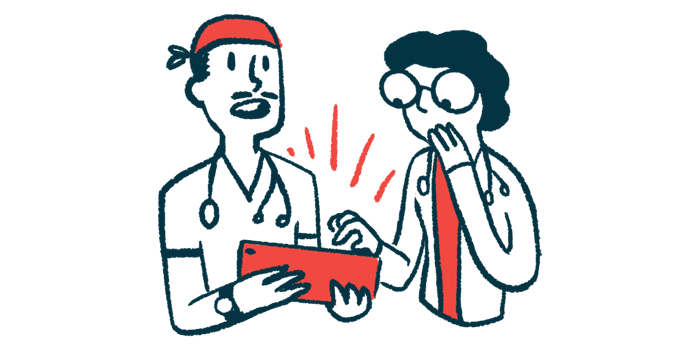Biogen, Ionis Stopping BIIB078 Development Due to Lack of Benefit

Based on data from a Phase 1 clinical trial, Biogen and Ionis Pharmaceuticals are discontinuing development of BIIB078, their experimental treatment candidate for amyotrophic lateral sclerosis (ALS) caused by mutations in the C9orf72 gene.
While the therapy was generally safe and well-tolerated in people with C9orf72-associated ALS, it resulted in no significant clinical benefit compared with a placebo.
The trial’s extension study (NCT04288856) — the only one currently active at this point — will be stopped. Full results of the therapy’s development will be presented at a future scientific meeting.
“We are incredibly grateful for the selfless commitment of the individuals with ALS who participated in the study, and the community’s dedication to advancing research for this devastating disease,” Toby Ferguson, MD, PhD, Biogen’s vice president and head of the neuromuscular development unit, said in a press release.
“While these were not the results we were hoping for, they are clear and will inform future research across our broad pipeline of investigational ALS therapies,” Ferguson said, adding that Biogen remains “focused on pioneering new treatments that will positively impact people living with this debilitating disease.”
Mutations in the C9orf72 gene are the most common genetic cause of ALS, accounting for up to 50% of familial ALS cases — those in which the disease was or is experienced by more than one person in the same family — and up to 10% of sporadic cases, occurring in people with no family history of ALS.
These mutations consist of too many repeats of six nucleotides — GGGGCC — in the C9orf72 gene. Of note, G stands for guanine and C for cytosine, two of the four building blocks of DNA.
While healthy people might have up to 30 copies of this sequence, ALS patients can carry hundreds or even thousands of copies. These excessive repeats lead to abnormal proteins that can form toxic clumps and contribute to neurodegeneration.
Initially developed by Ionis and later acquired by Biogen, BIIB078 is an antisense oligonucleotide (ASO). It was designed to suppress the production of abnormal forms of the C9orf72 protein while preserving its normal forms.
ASOs are lab-made or synthetic short molecules designed to target specific messenger RNAs (mRNAs) — the molecule derived from DNA that guides protein production. These mRNAs are marked for destruction, which ultimately limits the generation of that protein.
As such, the therapy was expected to help prevent further neurodegeneration.
The Phase 1 trial (NCT03626012) evaluated BIIB078’s safety, tolerability in 106 adults with ALS associated with C9orf72 mutations. The therapy’s pharmacokinetics — its movement into, through, and out of the body — and preliminary effectiveness also were assessed.
Participants were recruited at sites in North America and Europe, and were randomly assigned to receive one of six doses of the therapy or a matching placebo, administered directly into the spinal canal. All regimens included three loading doses and two or five maintenance doses.
The trial’s main goal was to assess the therapy’s safety and tolerability. Secondary goals included pharmacokinetics and changes in validated measures of disability, lung function, muscle strength, and tongue strength. Regular assessments were done for up to 323 days, or about 10.5 months.
The newly announced results showed that BIIB078 was generally well-tolerated, meeting the study’s main goal.
Most adverse events were mild to moderate in severity and occurred at similar rates across BIIB078 and placebo groups. The most commonly reported adverse events included falls, pain associated with spinal canal injection, and headaches.
However, “BIIB078 did not meet any secondary efficacy [goals] and it did not demonstrate clinical benefit,” the companies stated in the release.
No consistent differences between the BIIB078 group and the placebo group were observed with doses of the therapy up to 60 mg. Meanwhile, patients given 90 mg showed a trend toward a greater decline across secondary efficacy goals than those on a placebo.
“C9orf72-associated ALS is a complex genetic form of ALS and there are multiple mechanisms by which the scientific community believes the C9orf72 gene causes disease,” said C. Frank Bennett, Ionis’ executive vice president, chief scientific officer, and franchise leader for neurological programs.
Bennett said BIIB078 was designed to “test the prevailing hypothesis” that toxicity linked with the excessive repeat-containing RNA was the cause of the mechanisms of disease for C9orf72-associated ALS.
“Unfortunately, this Phase 1 study did not support the hypothesis, suggesting that the disease mechanism is much more complex,” Bennett said.
The companies said they would be discontinuing the therapy’s development, including its ongoing open-label extension study.
“While these results do not support further development of BIIB078, we anticipate they will provide valuable learnings that lead to a deeper understanding of this form of ALS,” Bennett said.
Notably, collaborations between Biogen and Ionis have resulted in two other ASO candidates in development for ALS: tofersen, also known as BIIB067, for patients with mutations in the SOD1 gene, and BIIB105, formerly known as ION541), for sporadic ALS.
In the previous Phase 3 VALOR trial (NCT02623699), tofersen failed to meet its main efficacy goal of significantly slowing disease progression, but was associated with some positive trends in terms of muscle strength, lung function, and quality of life.
The therapy also is being evaluated in another Phase 3 trial in people with SOD1 mutations who have not yet developed ALS. That study, called ATLAS (NCT04856982), is actively recruiting adults at sites in the U.S., Canada, Europe, Asia, Brazil, Russia, and Australia.
BIIB105 is being tested in a Phase 1/2 trial (NCT04494256) in adults with sporadic ALS. The trial may still be recruiting at sites in the U.S. and Europe; more information can be found here.








